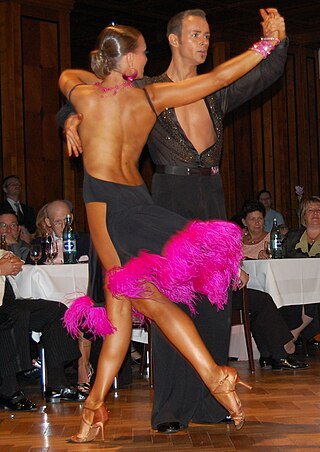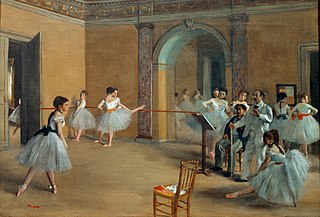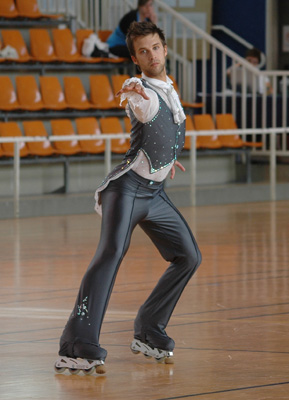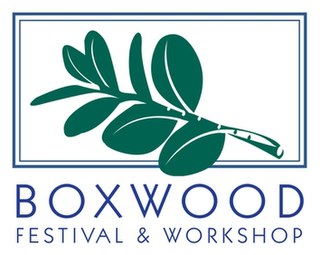
Ballroom dance is a set of European partner dances, which are enjoyed both socially and competitively around the world, mostly because of its performance and entertainment aspects. Ballroom dancing is also widely enjoyed on stage, film, and television.

Vintage dance is the authentic recreation of historical dance styles.

Swing dance is a group of social dances that developed with the swing style of jazz music in the 1920s–1940s, with the origins of each dance predating the popular "swing era". Hundreds of styles of swing dancing were developed; those that have survived beyond that era include Charleston, Balboa, Lindy Hop, and Collegiate Shag. Today, the best-known of these dances is the Lindy Hop, which originated in Harlem in the early 1930s. While the majority of swing dances began in African-American communities as vernacular African-American dances, some influenced swing-era dances, like Balboa, developed outside of these communities.
Modern Jive is a dance style derived from swing, Lindy Hop, rock and roll, salsa and various other dance styles, the main difference being the simplification of footwork by removing syncopation such as chasse. The term "French Jive" is occasionally used instead, reflecting the origins of the style, as is the term "Smooth Jive". The word "modern" distinguishes it from ballroom Jive.
LeRoc is a form of Modern Jive, a dance style that evolved in the 1980s out of dances including Swing, Lindy Hop and Rock and Roll. The main innovation was to simplify the footwork, making LeRoc very adaptable to different types of music in a 4-beat, fast or slow.

Partner dances are dances whose basic choreography involves coordinated dancing of two partners, as opposed to individuals dancing alone or individually in a non-coordinated manner, and as opposed to groups of people dancing simultaneously in a coordinated manner.

Dancesport is competitive ballroom dancing, as contrasted to social or exhibition dancing. In the case of Para dancesport, at least one of the dancers is in a wheelchair.

Classical ballet is any of the traditional, formal styles of ballet that exclusively employ classical ballet technique. It is known for its aesthetics and rigorous technique, its flowing, precise movements, and its ethereal qualities.

Artistic roller skating is a competitive sport similar to figure skating but where competitors wear roller skates instead of ice skates. Within artistic roller skating, there are several disciplines:

A Feis or Fèis is a traditional Gaelic arts and culture festival. The plural forms are feiseanna and fèisean. The term feis is commonly used referring to Irish dance competitions and, in Ireland, to immersive teaching courses, specialising in traditional music and culture. Although it is Irish, in Scottish Gaelic, the accent is important because there is a difference of meaning and pronunciation between feis and fèis — the word feis means sexual intercourse.
The Inter Varsity Dance Competition (IVDC) is an annual student dancesport competition organised by Inter Varsity Dance Association (IVDA). The IVDA write rules regarding entries, dress code and which dances will be part of the competition.
The National Folk Festival (NFF) is a longstanding, Australian family friendly celebration of all aspects of folk music and culture. It is held every year at Easter in the national capital, Canberra.

Baton twirling is a sport that combines dance and color guard to create coordinated routines. It requires a "baton" which is metal rod, typically just slightly larger than one's dominant arm. The sport can be seen in national and international competitions including the USA Junior Olympics.
Sabra Elise Johnson is a Dutch dancer, choreographer, and actress from Roy, Utah and the season 3 champion of the Fox reality television show So You Think You Can Dance.
Oxford University Dancesport Club (OUDC) is Oxford University's largest sports club and is the second largest club at the university after the Oxford Union. Founded in 1968 it currently has an annual membership of around 800 members. It runs professionally taught classes in the following dance styles:
The fifth season of the Australian Dancing with the Stars premiered on 26 September 2006. Daryl Somers and Sonia Kruger returned as hosts, while Todd McKenney, Paul Mercurio, Helen Richey, and Mark Wilson returned as judges.
Shimmy is a fitness television series broadcast in Canada on ONE: The Mind and Body Channel that emphasizes the health benefits of belly dance. The twenty-six episode series was designed by and created by Kim Pechet, a belly dance instructor and fitness professional. An original Canadian production, Shimmy premiered October 1, 2007 on ACCESS and CLT in Canada as well as in the United States on Discovery Health and OWN. Shimmy has been broadcast throughout Central and South America, Germany, and India as well as in Canada and the United States.

City Academy is an adult creative and performing arts academy, offering daytime, evening and weekend courses in dance, drama, singing, writing, filmmaking, photography, art, design, life skills, & business training in venues across Central London.

The Boxwood Festivals and Workshops are a series of music and dance festivals and workshops produced by Boxwood Festivals, Ltd., which "aims to provide opportunities for the dissemination, sharing, presentation and celebration of traditional music." There are three multi-day festivals scheduled annually, and other one-off workshops throughout the world. During these three festivals participants are joined by the local community for music, concerts, dances, classes, and informal music sessions. The music workshops are open to players of any instrument and skill level. The three annual events include classes led by Boxwood's Director, wooden flute player Chris Norman, for which he was awarded a Queen Elizabeth II Diamond Jubilee Medal, and Cape Breton fiddle and Baroque violinist David Greenberg. Other artists are invited to lead classes at the Boxwood Canada and Boxwood Williamsburg festivals.









